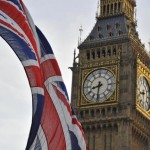London’s Latest Boom Is in Billionaires

Tucked into the U.K, the world’s seventh-richest country with an annual GDP of about $2.5 trillion, is an island of rich people with its own subculture, customs, habits and proclivities.
London now has more billionaires than any other city in the world, according to the Sunday Times newspaper. Britain has 104 billionaires, up from 88 last year, with 72 living in the capital. Moscow has 48, while New York trails third with 43. Moreover, nine of the U.K.’s top ten are foreigners; the Duke of Westminster only just sneaks into tenth place with a paltry 8.5 billion pounds. The combined wealth of the U.K.’s megarich is 301 billion pounds ($508 billion).
If Britain’s billionaires declared independence, their Kingdom of Richistan, population 104, would be the 24th richest country in the world. It would be sandwiched between Iran (population 80 million) with an annual gross domestic product of $514 billion, and Norway (5 million people) which generates $500 billion:
While a relatively benign tax architecture is undoubtedly a strong selling point, the U.K.’s main attraction to the world’s wealthy is a legal regime that respects private property, a political system that is relatively uncorrupt, and an economy that typically drifts rather than lurches. Britain is unlikely to unilaterally confiscate assets or seize bank accounts, though the prospect of increased sanctions against individual Russians for their country’s Ukrainian adventures may test that principle. You won’t wake up one morning and find you’ve fallen out of favor with the son of a minister who then freezes your assets. And if you do fall foul of the law, you’ll probably get a fair hearing.
Moreover, Britain isn’t in the habit of ratting on its inhabitants to foreign tax inspectors. What happens in London stays in London. Switzerland, long regarded as the destination of choice, has blotted its copybook twice, both by sharing bank account details with the U.S. tax authorities, and by imposing a cap on its currency that free-market proponents view as heretical.
For the U.S., meantime, tougher asset-disclosure rules scheduled for July are prompting more of the estimated 6 million Americans living overseas to consider abandoning their citizenship, Bloomberg News reports. The number of expatriates surrendering their U.S. nationality climbed to 1,001 in the first quarter, up from 679 a year earlier, according to Federal Register figures released earlier this month. The number of U.S. passport-rippers tripled to 3,000 in 2013 from the previous year, Internal Revenue Service data shows.
While having more rich people around the place buying stuff and hiring staff is undoubtedly a good thing, there are some drawbacks.
Firstly, there’s a U.K. political storm brewing about London house prices, which may well result in new taxes on foreigners who don’t live in the properties they buy. Average London property values are double those for the rest of the country and have surged 60 percent in the past five years, compared with a 27 percent increase outside of the capital. Overseas money seeking a refuge in Islington apartments may find it has overstayed its welcome when even the lowest rung on the property ladder is out of bounds to locals.
Secondly, in times of economic austerity, the risk of social unrest is never far away. With an election a year away, the U.K. government has to tread a careful path between keeping the population convinced of the merits of fiscal rectitude, while resisting the temptation to chase votes by using the fruits of economic recovery to fund tax cuts for the better-off.
“Let me tell you about the very rich,” F. Scott Fitzgerald wrote in “Rich Boy,” a short story. “They are different from you and me. They possess and enjoy early, and it does something to them, makes them soft where we are hard, and cynical where we are trustful, in a way that, unless you were born rich, it is very difficult to understand. They think, deep in their hearts, that they are better than we are because we had to discover the compensations and refuges of life for ourselves.”
Money goes where it’s wanted and stays where it gets looked after. And, for now at least, money loves London and London loves money.
Author: Mark Gilbert is a Bloomberg View columnist and a member of the Bloomberg View editorial board. He has worked at Bloomberg News since 1991, most recently as London bureau chief. He is the author of “Complicit: How Greed and Collusion Made the Credit Crisis.
Source: bloomberg





























